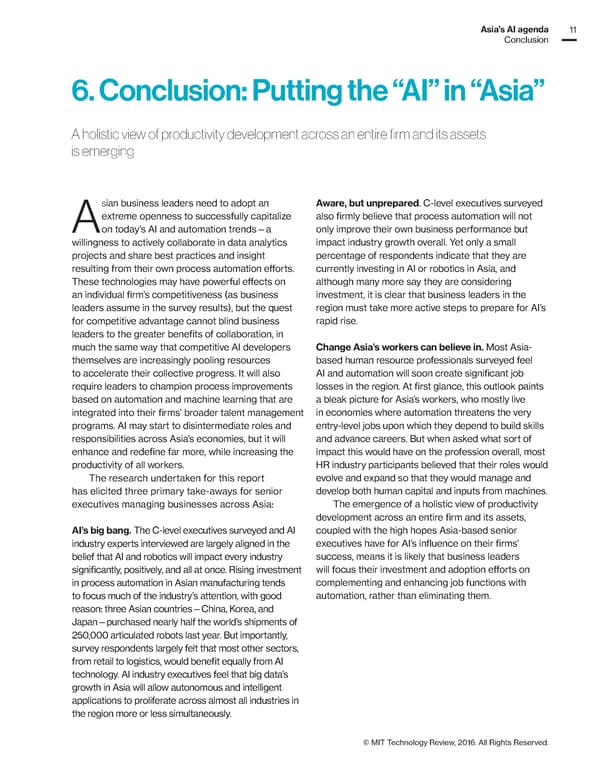Asia’s AI agenda 11 Conclusion 6. Conclusion: Putting the “AI” in “Asia” A holistic view of productivity development across an entire firm and its assets is emerging sian business leaders need to adopt an Aware, but unprepared. C-level executives surveyed extreme openness to successfully capitalize also firmly believe that process automation will not Aon today’s AI and automation trends—a only improve their own business performance but willingness to actively collaborate in data analytics impact industry growth overall. Yet only a small projects and share best practices and insight percentage of respondents indicate that they are resulting from their own process automation efforts. currently investing in AI or robotics in Asia, and These technologies may have powerful effects on although many more say they are considering an individual firm’s competitiveness (as business investment, it is clear that business leaders in the leaders assume in the survey results), but the quest region must take more active steps to prepare for AI’s for competitive advantage cannot blind business rapid rise. leaders to the greater benefits of collaboration, in much the same way that competitive AI developers Change Asia’s workers can believe in. Most Asia- themselves are increasingly pooling resources based human resource professionals surveyed feel to accelerate their collective progress. It will also AI and automation will soon create significant job require leaders to champion process improvements losses in the region. At first glance, this outlook paints based on automation and machine learning that are a bleak picture for Asia’s workers, who mostly live integrated into their firms’ broader talent management in economies where automation threatens the very programs. AI may start to disintermediate roles and entry-level jobs upon which they depend to build skills responsibilities across Asia’s economies, but it will and advance careers. But when asked what sort of enhance and redefine far more, while increasing the impact this would have on the profession overall, most productivity of all workers. HR industry participants believed that their roles would The research undertaken for this report evolve and expand so that they would manage and has elicited three primary take-aways for senior develop both human capital and inputs from machines. executives managing businesses across Asia: The emergence of a holistic view of productivity development across an entire firm and its assets, AI’s big bang. The C-level executives surveyed and AI coupled with the high hopes Asia-based senior industry experts interviewed are largely aligned in the executives have for AI’s influence on their firms’ belief that AI and robotics will impact every industry success, means it is likely that business leaders significantly, positively, and all at once. Rising investment will focus their investment and adoption efforts on in process automation in Asian manufacturing tends complementing and enhancing job functions with to focus much of the industry’s attention, with good automation, rather than eliminating them. reason: three Asian countries—China, Korea, and Japan—purchased nearly half the world’s shipments of 250,000 articulated robots last year. But importantly, survey respondents largely felt that most other sectors, from retail to logistics, would benefit equally from AI technology. AI industry executives feel that big data’s growth in Asia will allow autonomous and intelligent applications to proliferate across almost all industries in the region more or less simultaneously. © MIT Technology Review, 2016. All Rights Reserved.
 Asia's AI Agenda Page 11 Page 13
Asia's AI Agenda Page 11 Page 13